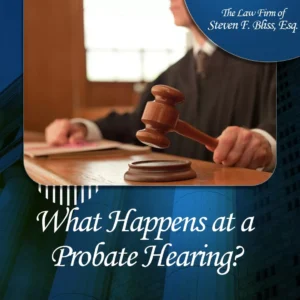What about Formal and Informal or Supervised Probate Proceedings?
What Happens at a Probate Hearing?
Listen to this Article on:
Details Of The Probate Court Hearings Explained.
What Happens at a Probate Hearing?
The time immediately following the death of a loved one is difficult. In addition to the normal grieving process, other logistical issues need to be dealt with, including commencing the probate process. Most people are intimidated by any court proceeding, but the initial probate hearing is a straightforward process. Understanding what to expect from the first probate hearing can help relieve stress associated with the probate process and allow litigants to focus on the other, more essential issues related to saying goodbye to a loved friend or family member.
Once a petition to probate an estate is filed, the court will issue an order setting a hearing. Any interested party will receive notice of the hearing. “Interested party” includes:

•The personal representative.
•Any heirs of the deceased.
•All creditors.
•Anyone named explicitly in the will.
Accordingly, any of these people or the representatives may choose to appear at the probate hearing. The first step taken at the hearing is for the court to take some essential testimony from the proposed personal representative. This testimony typically centers around the information contained in the initial petition requesting that they will be probated.
Any additional information that will aid the court in deciding on whether it should approve the estate may also be taken, including the identity of the deceased, the relationship between the dead and the proposed personal representative, and the reason the estate needs to be probated. After the judge permits the petition to probate the estate, the court will enter an order that appoints the personal representative to administer the estate.
Please Help Us Spread The Word By Giving Us a 5 Star Rating on This Article
Free Initial Consultation with
Steven F. Bliss Esq.

★ ★ ★ ★ ★

The court will then issue Letters Testamentary.
These will allow the personal representative to conduct their duties in probating the estate. The personal representative should obtain a certified copy of the Letters Testamentary so that they can demonstrate the necessary legal authority to handle the estate.
It is important to note that many courts have specific local rules concerning probate hearings. These rules often discuss when and how a probate hearing will be held. However, regardless of local regulations, the fundamental reason and content of the initial probate hearing remain the same.
The court process can be complicated, and if you are trying to probate the will of a loved one, you need an experienced attorney to help you navigate it. We have extensive professionals assisting clients with these issues. Contact us today and let us answer your questions about probate.
Call Steve Bliss Law Office When You Need Assistance with the probate process.
